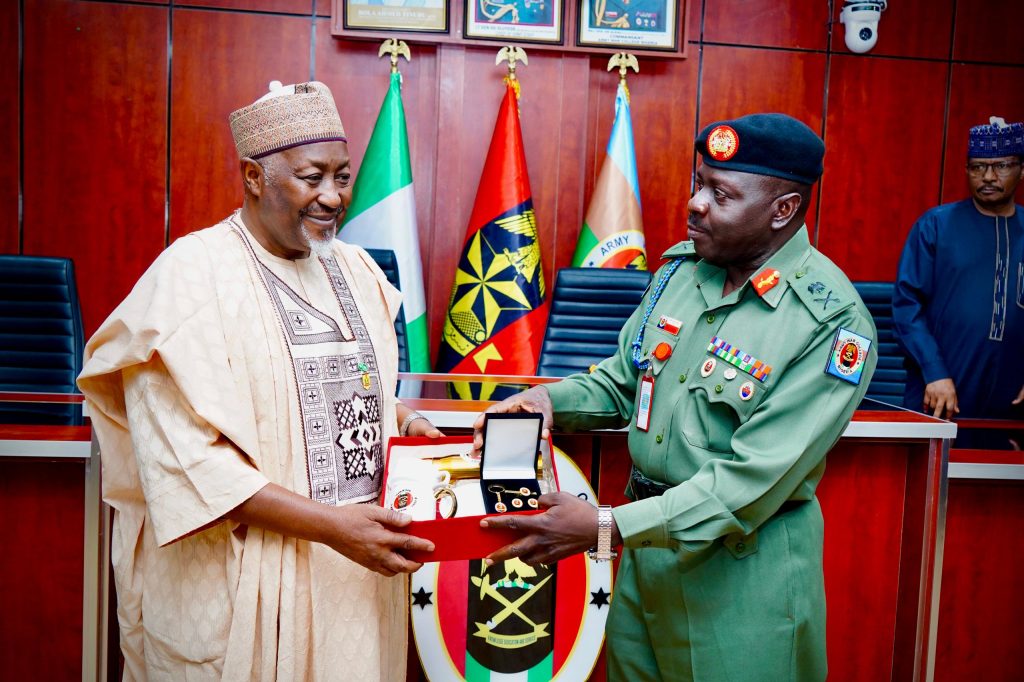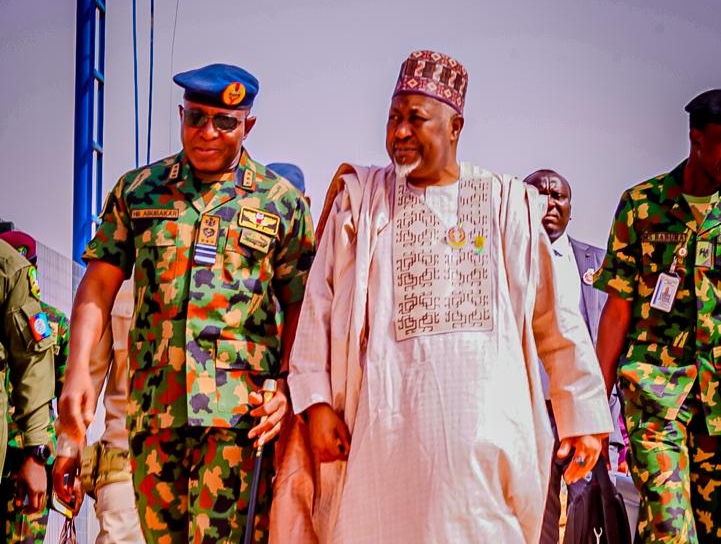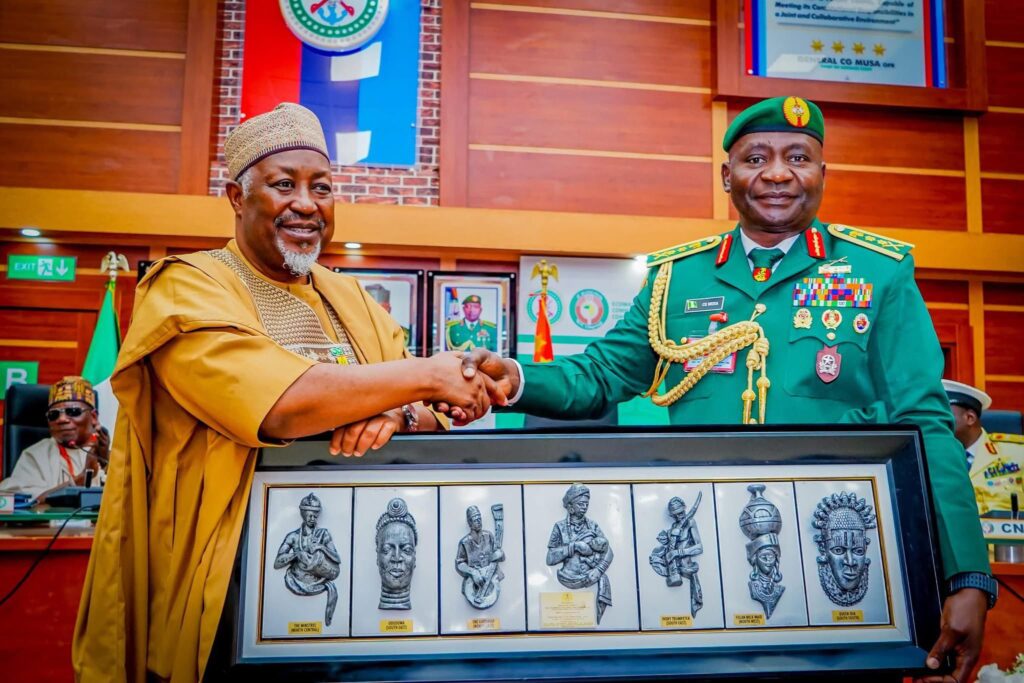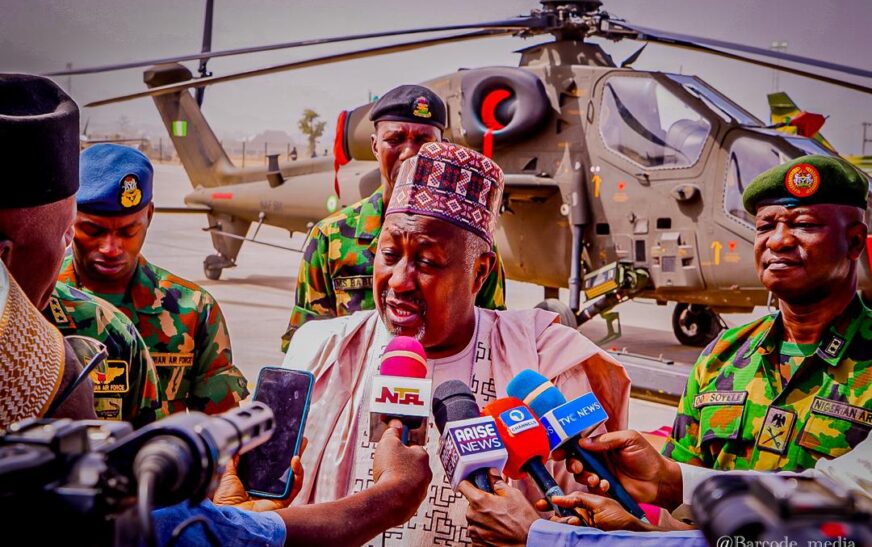Chapter 1: From Governance to National Defence
Born on September 19, 1962, in Babura, Jigawa State, Mohammed Badaru Abubakar has built a remarkable career that bridges business, governance, and national defence. After earning a Bachelor of Science degree in Accounting from Ahmadu Bello University, Zaria, he ventured into entrepreneurship, establishing the Talamiz Group in 1991, which expanded into agriculture, manufacturing, logistics, and commodity distribution. His business acumen earned him national recognition and leadership roles in key industry associations, reflecting both strategic thinking and organizational skill.

Badaru transitioned into public service when he was elected Governor of Jigawa State in 2015, serving until 2023. His tenure was marked by transformative initiatives, including the construction of one health facility in each of the state’s 287 wards and the allocation of five percent of the state budget to healthcare. His emphasis on transparency, accountability, and inclusive governance positioned Jigawa as a model of development and peace in Nigeria’s North-West region.
This blend of entrepreneurial leadership and governance experience set the stage for his appointment as Nigeria’s Minister of Defence on August 21, 2023. Drawing on his multifaceted background, Badaru brought a visionary approach to national security, emphasizing efficiency, modernization, and strategic foresight.
Chapter 2: Strategic Vision for National Security
From the onset of his tenure, Minister Badaru highlighted the importance of a collaborative approach to national security. Recognizing that military force alone cannot resolve Nigeria’s complex threats ranging from insurgency and banditry to cybercrime he advocated for synergy among security agencies, traditional rulers, religious leaders, and community stakeholders. By integrating grassroots intelligence with formal military operations, he created a more responsive and adaptive security framework capable of addressing both immediate and long-term challenges.
Central to his vision is strategic defence management, a philosophy linking security directly to Nigeria’s sovereignty, peace, and socioeconomic growth. Under his guidance, this approach focuses on resource optimization, threat anticipation, capacity building, and community engagement. By proactively addressing emerging threats, from terrorism to cyber-attacks, and ensuring military preparedness, Badaru has positioned security as a driver of national development rather than merely a reactive measure.

Through this strategic framework, he emphasizes that lasting security requires unity of purpose, foresight, and integration between military operations and societal support systems a paradigm shift that strengthens Nigeria’s resilience across all levels of governance.
Chapter 3: Modernization of Defence Infrastructure
A hallmark of Badaru’s tenure is the modernization of Nigeria’s defence infrastructure. Recognizing that contemporary security challenges demand advanced technology and rapid response capabilities, he prioritized investment in modern combat systems, surveillance and reconnaissance tools, and communication networks to enhance operational effectiveness.
He has also championed the Defence Research and Development Bureau (DRDB), promoting indigenous innovation as a means to reduce dependency on foreign technology and to develop solutions tailored to Nigeria’s unique security landscape. Initiatives under his leadership include the development of local weapon systems, drones, cyber-defence capabilities, and the integration of intelligence-driven operational technologies.
Beyond equipment, Badaru has overseen the upgrading of military infrastructure, including barracks, training facilities, logistics hubs, and joint operational centers. These efforts ensure interoperability across the Army, Navy, and Air Force, improving coordination during joint operations and enhancing the military’s overall readiness. His modernization agenda reflects a long-term vision: a self-reliant, technologically advanced, and strategically agile defence system capable of responding to evolving threats while safeguarding national sovereignty.
Chapter 4: Strengthening International Partnerships
Minister Badaru understands that Nigeria’s security challenges often transcend national borders. He has therefore prioritized regional and global engagement as a critical element of defence strategy. Through ECOWAS, the Multinational Joint Task Force, and bilateral agreements with key global partners, Badaru has strengthened intelligence-sharing, coordinated joint exercises, and promoted technology transfer to improve Nigeria’s operational capabilities.
At international forums, including the United Nations General Assembly, he has advocated for cooperative efforts to curb small arms proliferation and transnational crime, while ensuring Nigeria’s contributions to peacekeeping and regional stability remain significant. His approach emphasizes mutual benefit, sovereignty preservation, and sustainable development, aligning international partnerships with Nigeria’s long-term security objectives.
By fostering strong alliances, Badaru positions Nigeria not only as a capable national defence actor but also as a respected regional and global partner in maintaining peace and security.
Chapter 5: A Legacy of Strategic Defence Leadership
Mohammed Badaru Abubakar’s legacy as Minister of Defence is defined by integration, modernization, and diplomacy. Domestically, he has implemented reforms that improve inter-agency coordination, transparency, and community engagement. Through modernization, he has equipped the Nigerian military with advanced technology, fostered indigenous research and development, and upgraded infrastructure for optimal readiness. Internationally, he has cultivated strategic partnerships that expand Nigeria’s operational capabilities and reinforce its regional and global influence.

The cumulative impact of his leadership is measurable: enhanced military readiness, technological advancement, stronger regional and international alliances, and improved collaboration with local communities. These achievements demonstrate a forward-looking, multidimensional approach to national security that balances immediate operational needs with long-term strategic goals.
Badaru’s tenure illustrates that effective defence leadership requires vision, innovation, and collaboration. By uniting domestic reforms, modernization, and international engagement under a single coherent strategy, he has redefined Nigeria’s defence landscape, laying the foundation for enduring peace, stability, and national prosperity.
Conclusion
Minister Mohammed Badaru Abubakar exemplifies the modern strategic defence leader one who combines experience in governance, business acumen, and global vision to tackle complex security challenges. His integrated approach, emphasizing collaboration, modernization, and diplomacy, ensures that Nigeria is better prepared to protect its sovereignty, foster peace, and contribute meaningfully to regional and global stability. His legacy is not only measured in reforms or acquisitions but in the sustainable frameworks he has established for a safer and more prosperous Nigeria.






